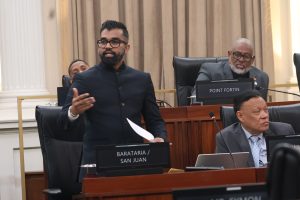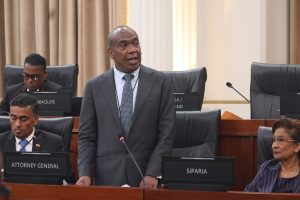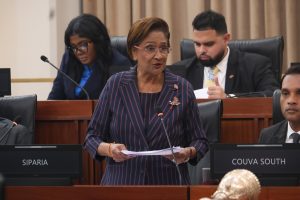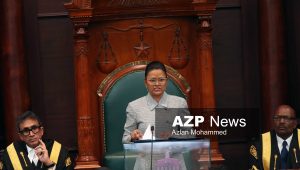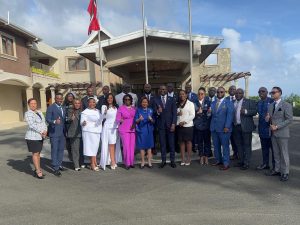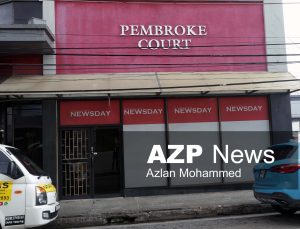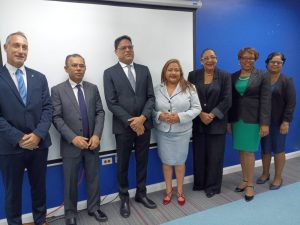Caption: University of Queensland lecturer Dr Wilma Blaser-Hart, left, Minister in the Ministry of Agriculture Avinash Singh, second left, UWI Principal Prof Rose-Maire Belle Antoine and Professor Pathmanathan Umaharan, left.
By Prior Beharry
THE cocoa industry must be upgraded for Trinidad and Tobago to build a sustainable economy when its oil and gas run out.
This was stated by Director of the Cocoa Research Centre (CRC) of The University of the West Indies (UWI) Professor Pathmanathan Umaharan on Wednesday. He was speaking at the CRC Annual Research and Development Symposium (CARDS) at the Auditorium at the School of Education at UWI in St Augustine.
Prof Umaharan listed five ways in which the industry could be improved – by using a value-chain approach, being sustainable, using innovation and technology, being evident based and collaborative.
Also speaking at the opening ceremony of the symposium were Minister in the Ministry of Agriculture Avinash Singh, Principal and Pro Vice Chancellor of UWI Prof Rose-Maire Belle Antoine and invited lecturer from the University of Queensland in Australia Dr Wilma Blaser-Hart.
Prof Umaharan said an industry cannot be built lopsided and every link of the value chain must be made sustainable. He said for many years, the industry has produced beans and exported it while giving the value away. He said, “We need to make every link of the value chain sustainable.”
Regarding sustainability, Prof Umaharan said, “We cannot expect farmers to live in poverty, we need to innovate production systems, business models, management methodologies, private sector services, technical assistance to make the farm business work for them.”
The professor, who received the nation’s highest award – the Order of the Republic of Trinidad and Tobago (ORTT) – last year, said rural communities have become impoverished without the cocoa and sugar cane industries.
He said challenges in the cocoa industry included labour costs, soil fertility, cadmium, parrots disease and markets.

Professor Pathmanathan Umaharan innovation and technology such as information technology, artificial intelligence, data science and drone technology must be used to deal with the challenges.
He also called for the industry to become more evidence bases, saying, “We can’t continue to stir the pot and hope that a genie will emerge from it. Doing what we did again and again with the same results is the definition of insanity.”
Professor Pathmanathan Umaharan said collaboration must include institutions, multi stakeholder platforms and the linking of businesses to farming for raw materials.”
He said, “Patriotism is about holding each other up.”
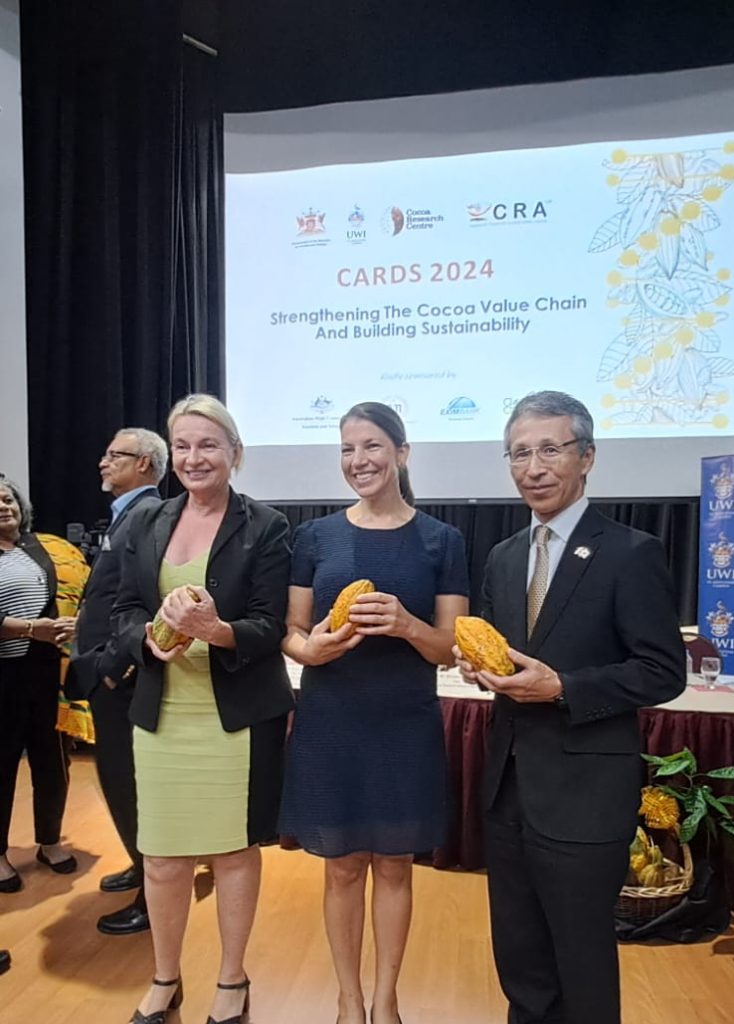
Prof Anotine said the CRC is one of the oldest research centres for cocoa in the world.
She said, “Our Cocoa Research Centre is the oldest research centre in cocoa, not just in the region but globally, with a 94-year legacy of continuous research in cocoa. The centre plays a crucial role as the custodian of the International Cocoa Genebank, which proudly houses the largest cocoa collection in the world, boasting over 2,300 varieties of cocoa preserved in a 100-acre estate.
“This remarkable achievement was made possible through the consolidation of historical collections from the Amazon region with support from the EU.
“Widely recognised as the ‘Noah’s Ark of Cocoa’, the centre actively continues to support breeding programmes around the world through its germplasm service and, more recently, a global DNA fingerprinting service. Additionally, it provides substantial support for a pioneering molecular breeding program, which stands as the first of its kind.”
Singh said cocoa can also help in diversifying the economy away from oil and gas.
He said, “Cocoa, as we all recognise, is not just a crop; it is a heritage and a pivotal element of our agricultural diversification strategy. Our country is uniquely positioned as a producer of 100% fine/flavour cocoa.
“This distinction is significant, as fine/flavor cocoa beans are more coveted and command higher prices globally, distinguishing our produce in a competitive market.
“Our Trinitario bean, a hallmark of our cocoa heritage, is a prime example of this having carved a niche in the international chocolate industry, making it a symbol of our potential to tap into premium markets.”
Singh also encouraged farmers to take advantage of the Agriculture-Incentive Programme.
Dr Wilma Blaser-Hart spoke about the use of AI to map cocoa agroforestry and carbon stocks in West Africa.
Also at the symposium, chaired by Chairman of the Cocoa Research Advisory Board Winston Rudder were European Union Ambassador Peter Cavendish; Ambassador of Japan Yutaka Matsubara; Australian High Commissioner Sonya Koppe; Charge’ d’ Affaires, Embassy of Peru Raul Daniel Loarte; and Marketing Manager of the EXIMBank Sheldon Thomas.

Support independent journalism. AZP News is an independent news organisation that is not affiliated with any big business and depends solely on advertising to pay our bills. Therefore, we are asking for the generosity of our readers to help us with small donations of any amount, but we will be happy with $20, $50 or $100. Click Here to Donate
![]()






